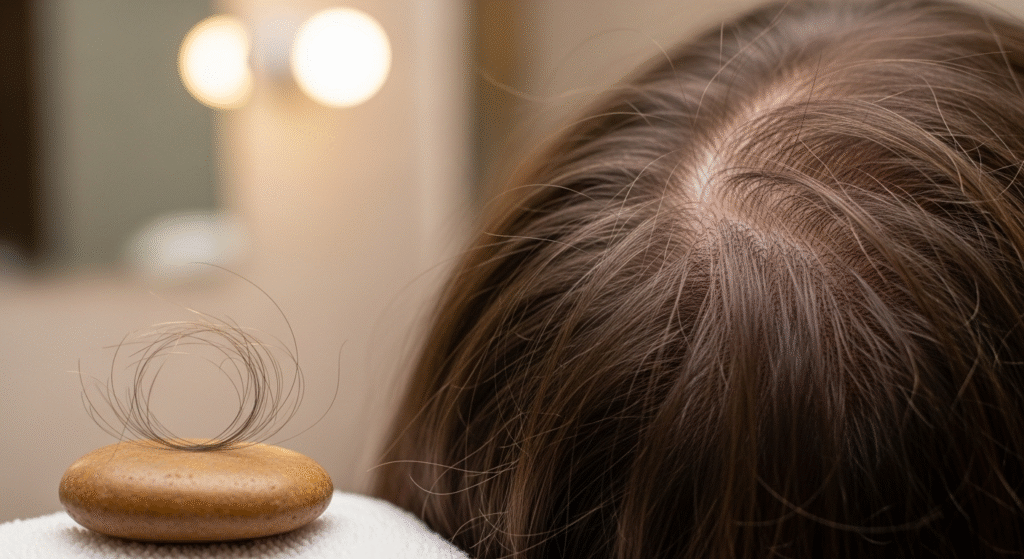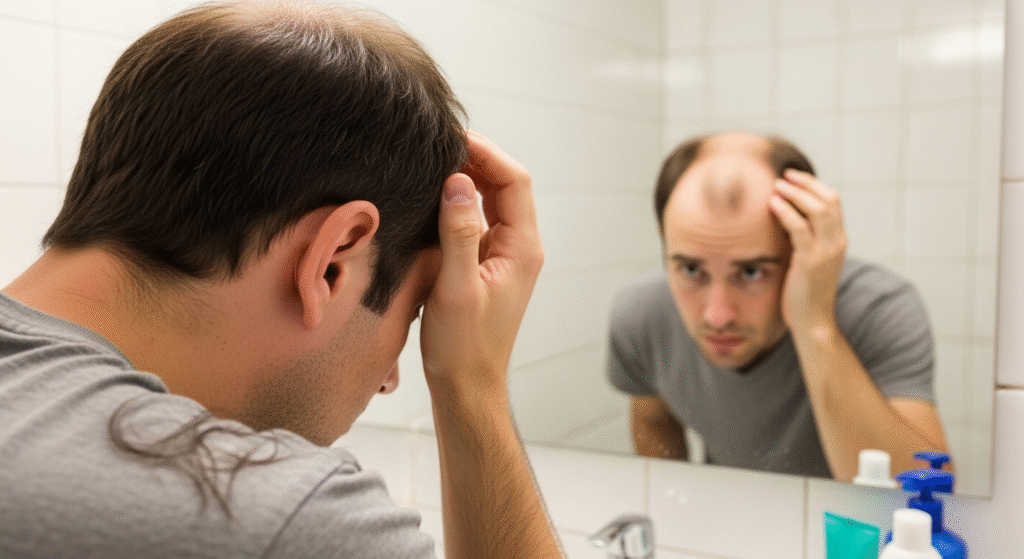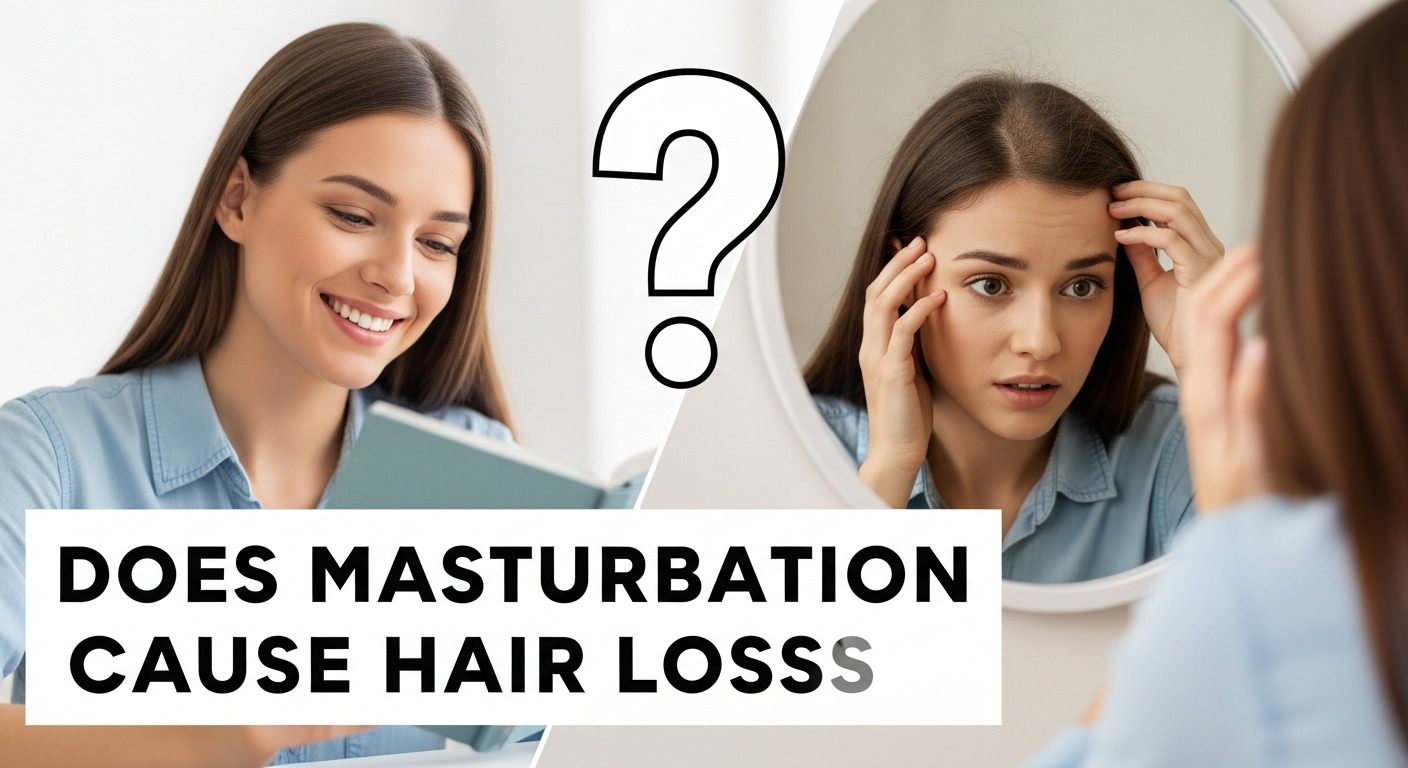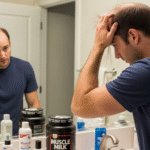Does Masturbation Cause Hair Loss? Masturbation is a normal and healthy part of life for many individuals. However, concerns about its effects on health, particularly hair loss, have been circulating for years. Some claim that frequent masturbation can lead to hair thinning or balding, but is there any truth to this? In this article, we’ll …
Does Masturbation Cause Hair Loss? Masturbation is a normal and healthy part of life for many individuals. However, concerns about its effects on health, particularly hair loss, have been circulating for years.
Some claim that frequent masturbation can lead to hair thinning or balding, but is there any truth to this? In this article, we’ll dive into the science behind hair loss, debunk myths, and provide expert insights to help you separate fact from fiction.
You’ll learn about the real causes of hair loss, what you can do to promote hair health, and whether masturbation truly plays a role in hair loss.

Understanding the Myth: Where Did It Originate?
Historical Beliefs and Cultural Myths
The myth linking masturbation to hair loss is not new. It has existed for centuries, often rooted in cultural and religious beliefs. In many ancient societies, masturbation was viewed with suspicion, associated with weakness, guilt, and a host of negative consequences for physical and mental health. One of the more persistent myths suggested that it could cause everything from blindness to hair loss.
While these claims were never based on scientific evidence, they persisted in cultural folklore and influenced societal views. Even today, the idea remains prevalent in certain circles, often causing unnecessary concern among individuals.
Scientific Examination of the Claims
Modern science has debunked many of the myths surrounding masturbation. No credible research has demonstrated any direct connection between masturbation and hair loss. In fact, studies on the effects of masturbation on physical health show minimal to no impact on hair thinning or balding.
Instead, hair loss is typically caused by other factors such as genetics, hormonal changes, nutritional deficiencies, and stress. Research indicates that the primary causes of hair loss are related to male pattern baldness, aging, and health conditions—not masturbation.
The Science Behind Hair Loss
Common Causes of Hair Loss
Hair loss can be attributed to a variety of factors, and understanding the science behind it is key to debunking myths like the masturbation-hair loss link. Here are some of the most common causes of hair loss:
- Genetics: The most significant factor in male and female pattern baldness. If hair loss runs in your family, you may be predisposed to experiencing thinning hair as you age.
- Hormonal Changes: Hormones play a crucial role in regulating hair growth. A condition known as androgenetic alopecia is driven by an imbalance in hormones, particularly an overproduction of dihydrotestosterone (DHT), which shrinks hair follicles.
- Nutritional Deficiencies: A lack of essential nutrients such as iron, zinc, and biotin can weaken hair and lead to thinning. Poor diet and malabsorption can exacerbate hair loss.
- Stress and Lifestyle Factors: High levels of stress trigger a condition called telogen effluvium, which pushes hair follicles into the shedding phase. Stress is a significant contributor to temporary hair loss.
The Role of Testosterone and DHT
Testosterone and DHT (a derivative of testosterone) are often at the center of discussions about hair loss, particularly male pattern baldness. DHT binds to hair follicles, gradually shrinking them and shortening the hair growth phase. Over time, this leads to thinner hair and, in some cases, baldness.
While testosterone levels can fluctuate slightly due to various factors (including masturbation), there is no evidence to suggest that masturbation significantly alters these levels in a way that would cause hair loss. The primary concern is typically a genetic predisposition to DHT sensitivity, not an increase in testosterone or DHT levels as a result of masturbation.
Expert Opinions and Medical Insights
Hormonal Studies and Findings
Hormonal fluctuations can affect hair health, but these changes are more likely due to underlying medical conditions, age, or lifestyle rather than masturbation. A study published in The Journal of Clinical Endocrinology explored the effects of masturbation on testosterone levels and found that while short-term fluctuations in testosterone may occur, there is no significant long-term impact on hair follicles.
The scientific consensus remains clear: masturbation does not alter the hormone levels enough to influence hair loss. Instead, focus should be placed on managing factors such as diet, stress, and genetics, which are more directly related to hair health.
Addressing the Concern: What You Can Do

Maintaining Healthy Hair Practices
While masturbation isn’t linked to hair loss, there are several habits and practices that can help maintain healthy hair:
- Proper Hair Care: Use gentle, sulfate-free shampoos and conditioners that nourish and protect the scalp. Avoid over-washing, which can strip natural oils and lead to dryness and breakage.
- Regular Scalp Massage: Massaging your scalp stimulates blood flow to hair follicles, which can encourage hair growth. Try using essential oils like peppermint or rosemary to further promote healthy hair.
- Balanced Diet: A nutrient-rich diet is essential for strong, healthy hair. Focus on eating foods high in vitamins and minerals, such as leafy greens, nuts, fish, and fruits, which support overall hair health.
Managing Stress and Hormonal Balance
Since stress is a major contributor to hair loss, finding ways to manage it effectively is key. Here are a few tips to keep stress levels in check:
- Exercise Regularly: Physical activity reduces cortisol (the stress hormone) and improves circulation, both of which benefit hair growth.
- Mindfulness and Relaxation: Practices such as yoga, meditation, and deep-breathing exercises can help reduce stress levels and improve overall health.
- Sleep Well: Aim for 7-9 hours of quality sleep each night. Poor sleep can negatively impact hormone levels and contribute to hair thinning.
Seeking Professional Advice
If you’re experiencing significant hair loss, it’s important to consult with a healthcare provider or dermatologist. They can help identify the underlying causes and recommend appropriate treatments. For example, medications like finasteride and minoxidil may help in certain cases of hair loss caused by genetics or hormonal imbalances.
FAQs
Does Masturbation Affect Testosterone Levels?
While masturbation can cause a temporary increase in testosterone levels, this spike is short-lived and doesn’t have a lasting impact on overall testosterone or hair health. The link between masturbation and testosterone levels is minimal.
Can Hair Loss Be Reversed?
In some cases, hair loss can be slowed or reversed, especially if it’s related to nutritional deficiencies or stress. Treatments like minoxidil, finasteride, and lifestyle changes can help improve hair growth.
When Should I Consult a Specialist?
If you’re noticing significant hair thinning or bald spots, it’s a good idea to consult a dermatologist. A professional can assess the cause of your hair loss and recommend appropriate treatments or lifestyle adjustments.
Conclusion
In conclusion, there is no scientific evidence supporting the idea that masturbation causes hair loss. Hair loss is typically influenced by factors such as genetics, hormones, stress, and poor nutrition. Masturbation is a normal and healthy activity that does not directly impact hair health. By focusing on maintaining a balanced lifestyle, managing stress, and seeking professional advice when necessary, you can promote optimal hair health and address any concerns you may have.
Ready To Take Your Next Step
If you’re concerned about hair loss and would like to explore personalized solutions, book a consultation with Dr. Uzma Irfan, an ISHRS-certified surgeon in Islamabad today. Discover the best course of action to restore and maintain your hair’s natural beauty.






